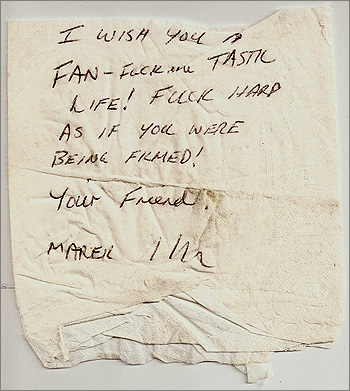
This note, scribbled on a piece of tissue paper, was found lying in the gutter outside a house where someone had obviously just moved out.
The text reads: “I wish you a fan-fucking-tastic life! Fuck hard as if you were being filmed! Your friend, Marek.”
Now this little piece of Found Art has been sitting in my files for at least a couple of years, so I wonder whether Marek’s friend has indeed had a fan-fucking-tastic life?
I also wonder why being filmed would make you more likely to “fuck hard” — and I’m assuming here that fucking “hard” is considered to be an improvement over any other kind of fucking. Personally, I suspect I’d find the presence of the camera to interfere with my confident enjoyment of the process and lead to performance anxiety — but maybe that’s just me.
And now, the fear sets in: what sorts of comments am I going to get on this post?
It’s been a while since I posted the first Found Art object. I’ll try to choose one from the files more regularly.

